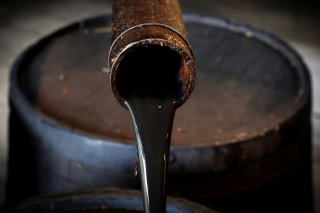Take the Oil? American Oil Company Finally Gets a Syrian Oil Deal
An American oil company now has a deal to modernize the oil industry in areas controlled by the Kurdish-led Syrian Democratic Forces, U.S. Secretary of State Mike Pompeo confirmed on Thursday.
An American oil company now has a deal to modernize the oil industry in areas controlled by the Kurdish-led Syrian Democratic Forces, U.S. Secretary of State Mike Pompeo confirmed on Thursday.
President Donald Trump ordered U.S. forces to “secure the oil” in northeastern Syria after withdrawing from a peacekeeping mission along the Syrian-Turkish border in October 2019. But the oil fields remain undeveloped, as U.S. economic sanctions have blocked investment into the Syrian oil industry.
Pompeo confirmed for the first time that an American oil company will begin work in the region, during his testimony to the Senate Foreign Relations Committee on Thursday.
“I talked to General Mazloum [Abdi] yesterday, with the SDF. Apparently they've signed a deal with an American oil company to modernize the oil fields in northeastern Syria. Are you supportive of that?” Sen. Lindsay Graham (R–S.C.) asked.
“We are,” Pompeo responded. “The deal took a little longer, Senator, than we had hoped, and now we’re in implementation.”
Syrian Kurdish diplomat Sinam Mohamad declined to comment, as did Abdulkarim Malak, the co-chair of the SDF-affiliated oil ministry.
It was not clear which company will be doing the work or whether any other companies were given an exemption to U.S. oil sanctions on Syria.
The U.S. Treasury’s Office of Foreign Asset Control does not comment on individual licenses, citing the need to protect trade secrets.
The deal could solve one of the most pressing issues in northeastern Syria.
The lack of modern oil infrastructure has forced the region’s inhabitants to rely on dangerous, primitive backyard refineries and high-risk smuggling operations to export their oil. Local doctors report massive increases in birth defects and other diseases as oil spills and plumes of smoke from poorly-maintained facilities pollute the water and air.
Modernizing the infrastructure would be a sigh of relief to local inhabitants.
It would serve a different purpose for some U.S. policymakers.
Hawks in the Trump administration have long viewed the counter-ISIS coalition with the SDF as a distraction from a more important goal—fighting Iranian influence in Syria—according to former National Security Advisor John Bolton.
Protecting the oil would allow U.S. forces to shift to an Iran-focused mission after the defeat of ISIS, especially as a key Iranian supply route to Lebanon passes near the oil-rich area of Deir al-Zor.
And it would keep the precious resource out of the hands of Bashar al-Assad, the Iranian-backed ruler of Syria.
Graham and other policymakers used oil to sell a continued U.S. presence in eastern Syria to Trump, according to Syrian Emergency Task Force executive director Mouaz Moustafa, who has worked closely with members of Congress.
“If you want to feed the baby medicine, you put the medicine in candy or something. That’s what happened with the oil,” Moustafa told the National Interest by phone in November 2019. “It’s like, ‘oh, you want to take the oil? Yeah, take the oil. We’ve got to take the oil.’ So that ended up becoming the reason that he would keep anyone there.”
Trump seemed to confirm this a few days after the National Interest interviewed Moustafa.
"The oil is secure," Trump told reporters during a November 13 meeting with Turkish president Recep Tayyip Erdoğan. "We left troops behind only for the oil."
Matthew Petti is a national security reporter at the National Interest. Follow him on Twitter: @matthew_petti.
Image: Reuters.

